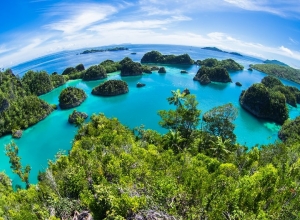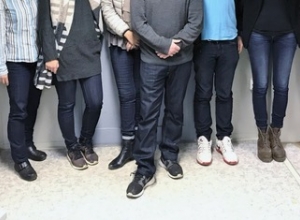Participatory Systems Thinking for Food, Energy and Water Security
The water-energy-food nexus is an evolving concept, covering many definitions and perspectives on the interconnections between these critical resources and the consequences when these connections are overlooked. It is also a concept evolving in both research and policy, two tracks that do not often intersect. Considering the ambitious targets of the 2030 sustainability agenda, it is timely to reflect on how to bring these together in a functioning science-policy-practice interface. In fact, we believe that integrating these tracks can provide opportunities for meaningful progress on sustainability challenges.
Water availability, security and access is critical to society and economies. According to the UN, a global population of 8.5 billion in 2030 means we will need 60% more food, 45% more energy and 30% more water. With staggering numbers like these, achieving the Sustainable Development Goals for water, energy and food will depend upon our will and ability to overcome "tunnel vision" and manage the risks and benefits created by these resource interdependencies.
Sector-based management "silos" are the way modern society copes with complexity. Yet the operational convenience yielded by dividing responsibility and authority also means that we lose out flexibility and the benefits of integrated environmental governance. The challenge is to negotiate equitable strategies for achieving governance and management of richly interconnected systems.
A number of recent reviews on nexus methodologies (like this, this and this) show the vast majority of studies have focused on computational modelling of system linkages. As one example, researchers Mohammad Al-Saidi and Nadir Ahmed Elagib conclude the "Nexus is a novel concept with few practical recommendations regarding governance". For this reason, policy actors are not always sufficiently equipped to navigate the complexity of these water-energy-food dependencies.
For the past four years our Linked Indicators for Vital Ecosystem Services Project (LIVES) in Cambodia has merged quantitative modelling and governance analysis in new ways to see hidden risks in water-energy-food systems. Based on results so far, we believe that participatory research, using systems thinking specifically, might play a key role in resolving existing differences between nexus analysis and nexus policy.
A growing number of people are using systems thinking to analyse the nexus with good policy relevant results. The UNU-FLORES, IIASA, WLE:CGIAR and Australian National University, among others, are applying systems thinking methods to nexus assessments. These initiatives are demonstrating that systems techniques are a valuable way of thinking about a nexus because they help us step outside the system, visualise interlinkages and consider the major "feedbacks" that drive how the system behaves. What is more, this helps with strategic planning when used to develop qualitative and/or quantitative scenarios.
This is powerful. But the most tangible impacts can come from encouraging participation in the systems mapping by actors from different levels. Peter Senge has long championed the learning that anybody can gain from engaging with systems thinking. Similarly, Donella Meadows suggested that we can all experience changes in our paradigms by seeing the system as a whole. More recently, group systems modelling has been shown to enable change in mental models, agreed problem framings and convergence on actions on a variety of sustainability issues (like this and this).
The research we conducted in Cambodia, with the Royal Government of Cambodia, the Royal University of Phnom Penh, the Royal University of Agriculture and WWF, shows participatory systems thinking can trigger new deliberations amongst stakeholders from different levels, from very local to national. Our project goal is to improve approaches available to policy experts, civil society groups and local communities for visualising and governing dynamic interdependencies between food, energy and water. We focus on participatory research because we assume that the conditions under which information is produced will determine if that information is useful, usable and used. We are finding that creating an open, inclusive research process to identify nexus indicators through group model building can drive better participation in policy making and develop new adaptive capacities. In the words of one of our team members in Cambodia:
"In terms of the participatory process, working together, we could challenge each other, learn from each other and discuss, find agreement points and talk through decisions. We can see clearly the awareness increasing of the government officials, in the researchers and the NGO staff – all of us! – about different ideas." – LIVES contributor, November 2017.
Participatory research is gaining momentum in the nexus research community. As two examples, the Stockholm Environment Institute and the University of Arizona have both recently experimented with co-production of water-energy-food nexus scenarios. A tentative conclusion across these studies is that participatory research opens up new opportunities for nexus governance by bringing nexus analysis and nexus policy together. This way of doing research can be time consuming and more uncertain compared to conventional nexus modelling, stakeholder consultations or policy dialogues. But in a complex world, it seems to us that quality processes can lead to opportunities for new cooperation towards systems change. Let’s commission more knowledge co-production for the nexus and engage in these processes. It does have an impact.
[Blog piece written for the OECD Forum and for expert-ise.ch]
Christian Bréthaut
Professor Christian Bréthaut is the Director of the Education and Knowledge Component of the Geneva Water Hub and the co-lead of the UNESCO Chair in Hydropolitics at University of Geneva. He holds a PhD in Geosciences and Environment from the University of Lausanne. His area of expertise is water governance and policy, with a particular focus on the management of transboundary rivers, the water-food-energy nexus and the science-policy interface.
Louise Gallagher
Dr. Louise Gallagher is the principal investigator leading the LIVES project, a flagship project of the UNESCO Chair in Hydropolitics. She holds a PhD in Environmental Studies from University College Dublin and has broad science-policy experience gained over ten years of working with organisations such as UN Environment and WWF. Her technical expertise includes valuation of natural capital and environmental externalities for integrated decision making in sustainable development.



